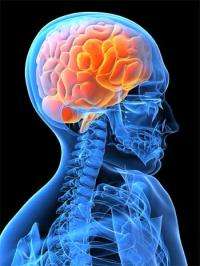Brainwaves could help understanding of mental health disorders

(PhysOrg.com) -- Researchers at the University of Aberdeen have unlocked the details of a communication process that helps to generate the brainwaves that allow us to think and learn.
Ultimately their findings, published this week in the Proceedings of the National Academy of Sciences, could lead to new insights into psychiatric disorders like schizophrenia and help guide future development of new anti-psychotic drugs.
The University of Aberdeen led team studied two types of brainwaves - theta and gamma waves - in the part of the brain responsible for learning and memory.
They have discovered that connections between rare types of nerve cells in the brain orchestrate the generation and interaction of these brain rhythms.
Brainwaves arise from synchronised activity of large groups of nerve cells and are required for efficient mental processing.
Rare cells in the brain - parvalbumin-expressing interneurons - are key to the whole process.
These cells send out inhibitory signals to thousands of other cells and therefore generate the brainwaves.
The team of biologists and mathematicians from Aberdeen, Boston and Heidelberg Universities reveal the actual link between these cells that helps trigger the brain activity.
The scientists also discovered that this link plays a part in how different brain waves interact with each other.
Dr Peer Wulff, who led the research in Aberdeen together with Dr Marlene Bartos and Professor Bill Wisden at the University's Institute of Medical Sciences, said: "We have discovered a cellular mechanism that controls brain rhythms. This is an area that scientists have hypothesised about over the past decade.
"Patients suffering from schizophrenia are known to have a loss of the type of cells that play a key role in this process.
"If we can understand more about the cellular mechanics of brainwaves then what we learn may one day lead to the development of better drugs for the treatment of psychiatric disorders."
Provided by University of Aberdeen




















